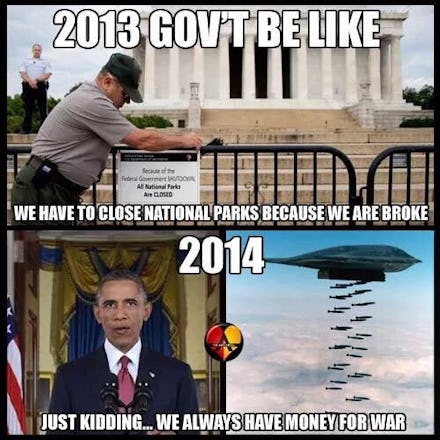One Meme Perfectly Sums Up How Screwed Up Government Priorities Are

The news: Almost exactly one year ago, Republicans shut down the federal government, claiming that the U.S. was rapidly approaching the limits of its ability to keep spending money on the social safety net, civilian bureaucracy and countless federal agencies that carry out national functions. It was a scary time.
But as this image from ZetaHybridProgram on Tumblr aptly shows, the formal justification Republicans gave for furloughing 800,000 federal workers, inconveniencing millions of others and shutting down national parks and facilities apparently doesn't apply to money spent on air campaigns and bombing raids.
Image Credit: ZetaHyrbidProgram/Tumblr
The U.S. is rapidly closing in on a $1 billion price tag for the young air war currently raging over Islamic State territory in Iraq and Syria. A new report from the Center for Strategic and Budgetary Assessments (CSBA) estimates the war on IS has already cost between $780 million and $930 million, and that's just the tip of the iceberg. Here's the summary of what it could ultimately cost, depending on how itchy America's trigger finger turns out to be, from the CSBA:
Assuming a moderate level of air operations and 2,000 deployed ground forces, the costs would likely run between $200 and $320 million per month. If air operations are conducted at a higher pace and 5,000 ground forces are deployed, the costs would be between $350 and $570 million per month. If operations expand significantly to include the deployment of 25,000 U.S. troops on the ground, as some have recommended, costs would likely reach $1.1 to $1.8 billion per month. On an annualized basis, the lower-intensity air operations could cost $2.4 to $3.8 billion per year, the higher-intensity air operations could cost $4.2 to $6.8 billion per year, and deployment of a larger ground contingent could drive annual costs as high as $13 to $22 billion.
Without a doubt, $22 billion is a lot of money. And keep in mind that estimates of how expensive a war might run often end up lowballing the total price. But however you slice it, that's likely at least a few billion taxpayer dollars a year being flown overseas and dropped on Iraq and Syria.
Give and take: And fittingly enough, $22 billion is close to the damage Standard & Poor's estimated last fall's 16-day shutdown did to the American economy — about $24 billion.
Right before the shutdown last year, House Majority Leader John Boehner (R-Ohio) repeatedly demanded to know why Obama wouldn't negotiate with Congress to address "Washington's spending problem." The subsequent 2014 budget deal that Republicans eventually obtained shaved around $23 billion from government spending, meaning Boehner may come up with about $1 billion or less in savings for his trouble.
Image Credit: AP
Changing times: Now as Congress looks to elections in November, no one is very concerned about rocking the boat over the U.S. attacks on IS, and certainly there's been little question of whether it's worth the money to recommit a huge amount of military equipment and personnel to conflicts in the Middle East.
Aside from a few ranklers like Sen. James Inhofe (R-Okla.) and Rep. Justin Amash (R-Mich.), the Los Angeles Times reports that pretty much everyone in Congress has been relieved to let President Obama move forward with the strikes without a tense congressional debate. Opposition on the right has mainly focused on the war's questionable constitutionality or whether an air campaign is too timid, with the latter faction proposing we hurry up and get boots on the ground before it's too late.
Considering that war with IS may ultimately be one of the most expensive things the country buys this year, this broad and relatively unquestioning support is yet another indication that the argument was never really about how much the federal government was spending, but where the money was going. Turns out there's always room in the budget for a war. Even modest cuts to the $500 billion annual defense budget President Obama secured this year are now in danger of being reversed.
Funny what a year, some panic and an excuse to deploy hundreds of millions of dollars in high-end military hardware can accomplish, right?